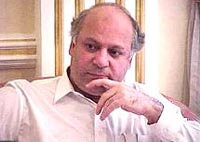Former PM Sharif deported to Saudi Arabia just hours after return to Pakistan

Just hours after landing in Pakistan from seven years in exile the former Prime Minister Nawaz Sharif, who hoped to campaign against the country's U.S.-allied military ruler, was deported to Saudi Arabia, officials said.
About four hours after he arrived on a flight from London, Sharif was taken into custody and charged with corruption, but was then quickly spirited to another plane and flown out of Pakistan toward Jeddah, a close aide to President Gen. Musharraf's said.
An intelligence official confirmed the information. Both officials spoke on condition of anonymity as they were not authorized to speak to media. There was no immediate formal announcement from the government.
Sharif's deportation apparently sidelines a powerful political enemy of the general, but it is likely to deepen Musharraf's growing unpopularity and reinforce public perceptions that he is an authoritarian ruler ahead of presidential and legislative elections.
It came despite a landmark Supreme Court ruling last month that the two-time former premier, whose elected government was ousted by Musharraf in a 1999 coup, had the right to return to Pakistan and that authorities should not obstruct him.
Musharraf's grip on power has faltered after a failed attempt to oust the country's top judge ignited mass protests, but he still plans to seek a new five-year term in office by mid-October.
His government is also struggling to combat surging Islamic extremism that has spread from the Afghan border where al-Qaida leader Osama bin Laden is believed to be hiding.
Sharif's brother, Shahbaz Sharif, who stayed behind in London, said their party would submit a petition with the court to challenge the deportation.
"This will be counted as the blackest day in Pakistan's history," he said on Geo TV. "I do not have words to describe my grief."
The deportation is likely to stoke confrontation with opposition activists, who battled police Monday morning on roads leading to Islamabad airport that authorities had blockaded with trucks, tractors and barbed wire. None were able to get close to the airport.
Police fired tear gas and supporters threw rocks in at least two locations near Islamabad and also a bridge on main highway leading to the capital from Pakistan's northwest frontier. Several people were injured at each clash, Associated Press reporters said.
Former President Rafiq Tarar, a Sharif loyalist, said he was roughed up in one confrontation. Witnesses said Tarar was later arrested.
At least four other senior opposition leaders were also put under house arrest, officials said.
Interior Ministry spokesman Brig. Iqbal Cheema said they were arrested "to ensure the maintenance of public order," under a regulation that allows authorities to detain suspects for up to three months without charge.
They included the head of a powerful political alliance that supports Sharif, Qazi Hussain Ahmed; another hard-line Islamiclawmaker, Liaqat Baluch; the acting president of Sharif's party, Javed Hashmi; and party chairman Raja Zafarul Haq, party and government officials said.
Seven years ago, Sharif was sent into exile in Saudi Arabia after he was convicted of terrorism and hijacking charges in Pakistan following the coup. Under a deal with Musharraf, Sharif allegedly promised to stay away for 10 years.
Saudi intelligence chief Prince Muqrin bin Abdulaziz Al Saud said Saturday in Islamabad that Sharif should respect the agreement and that Saudi Arabia was ready to take him back.
After arriving by a Pakistan International Airlines flight from London, Sharif was surrounded by black-uniformed commandos inside the plane then shifted to the airport's VIP lounge, where a senior investigator from Pakistan's anti-corruption body served an arrest warrant.
The investigator, Azhar Mahmood Qazi, said Sharif was being arrested on money-laundering and corruption charges stemming from a sugar mill business several years ago. Sharif was accused of laundering 1.2 billion rupees (US$21.2 million), he said.
Chaudhry Shujaat Hussain, president of Pakistan's ruling party, said Sharif had been given a choice of going into exile again or be arrested. He said Sharif had chosen detention. But it soon emerged soon after Sharif was being flown out of the country to Saudi Arabia.
That scuppered his plans to travel in a grand motorcade to his home and political base in Lahore, about 290 kilometers (180 miles) to the south of Islamabad, to kick-start his campaign against Musharraf.
"Musharraf is capable of doing anything," Sharif told reporters on the flight from London. "He could impose martial law, but if he does, he will be the first casualty becuse the country will not accept that, the people will not accept that and I think the rank and file of the army will not accept that."
Sharif's return was widely seen as a challenge to Musharraf's efforts to reach a possible power-sharing deal with another exiled former premier Benazir Bhutto that would allow him to extend his rule.
Bhutto wants corruption charges against her to be dropped and for a chance to become prime minister for a third time after general elections due by mid-January 2008.
But Bhutto herself could face growing opposition within her own party to the idea of teaming up with the military leader whose credentials as a pro-democrat will be more fragile than ever.
Wajid Hasan, Bhutto's spokesman, said the Sharif's deportation did not affect her plans to return to the country and she would announce her travel date Friday.
"She doesn't have any problem that Nawaz Sharif has between Saudi Arabia and Pakistan," Hassan told the AP in London. "The only thing that they can do is to arrest her and keep her in Pakistan because she can't be deported like Mr. Nawaz Sharif."
He said Sharif's expulsion was "typical of a government that doesn't believe in any decency or rule of law."
Subscribe to Pravda.Ru Telegram channel, Facebook, RSS!





